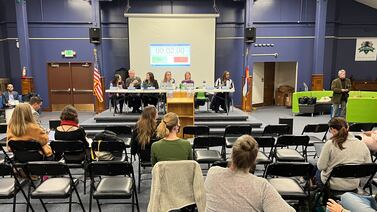Colorado won’t seek to reduce standardized testing or get waivers from federal testing requirements anytime soon.
The sponsors of a bill that aimed to reduce the burden of standardized testing and encourage school districts to experiment with new ways to measure student achievement withdrew the legislation this week.
Groups that support education reform and test-based school accountability — ideas with which Gov. Jared Polis and many Democrats align — had opposed the bill. It’s also not clear how receptive the federal education department would have been to a waiver request.
State Rep. Eliza Hamrick, an Arapahoe County Democrat and retired teacher, said she brought the legislation because she’s seen pressures around testing have a negative impact on education. She’s also been impressed with the work of Colorado school districts that have participated in a pilot around innovative local accountability systems. She wanted to secure federal funding to continue that work and expand it to new districts.
Many school district leaders said they don’t oppose standardized tests, but the current testing regime takes up weeks of time without providing much actionable data.
House Bill 1239 would have required Colorado to reduce testing to the minimum required under federal law, seek waivers to reduce testing further, and apply for grants to promote local experimentation.
Colorado students take English language arts and math tests in third through eighth grades, the PSAT in ninth and 10th grade, and the SAT in 11th grade, as well as science tests in fifth, eighth, and 11th grades.
Other than the PSAT, these tests are required under federal law, though some educators question whether the tests need to be as long and involved as they are.
A social studies test given to a sampling of fourth and seventh graders — required by state but not federal law — already is set to be eliminated this year.
Colorado law also requires other assessments, such as tests to identify struggling readers in early elementary school, that the bill may have eliminated.
Co-sponsor state Rep. Jennifer Bacon, a Denver Democrat and former school board member and teacher, said she recognized the desire among many education advocates to keep certain tests that aren’t required by federal law, such as the early reading assessments and the PSAT.
The legislators said they have received assurances that a task force looking at potential changes to the school accountability system will consider how Colorado uses standardized testing and look closely at the results of the local accountability pilots.
The state system rates schools mostly based on test scores, as well as factors like graduation rates and college enrollment. The experimental local programs have incorporated other measures, such as school climate, the quality of instruction, and student engagement.
Education advocates say they support a more nuanced look at what makes a good school, but they want data that allows for consistent comparisons across schools and districts as well as across time.
House Bill 1241, which would create the school accountability task force, passed the House with broad bipartisan support. It’s due for a hearing in the Senate Education Committee Wednesday.
The task force would produce a final report in November 2024, and the legislature wouldn’t take up recommended changes until 2025.
Bureau Chief Erica Meltzer covers education policy and politics and oversees Chalkbeat Colorado’s education coverage. Contact Erica at emeltzer@chalkbeat.org.







